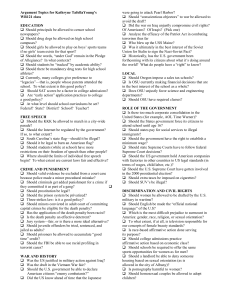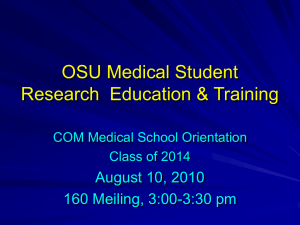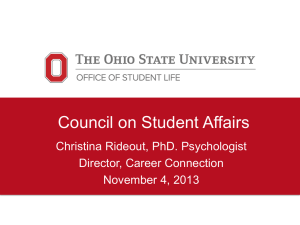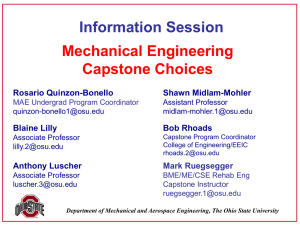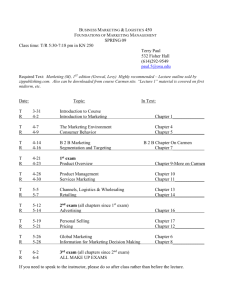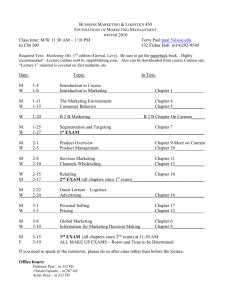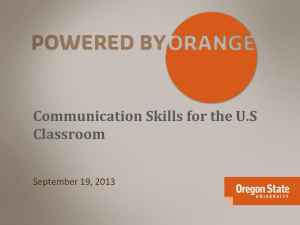Veteran Four Year Career Planner
advertisement
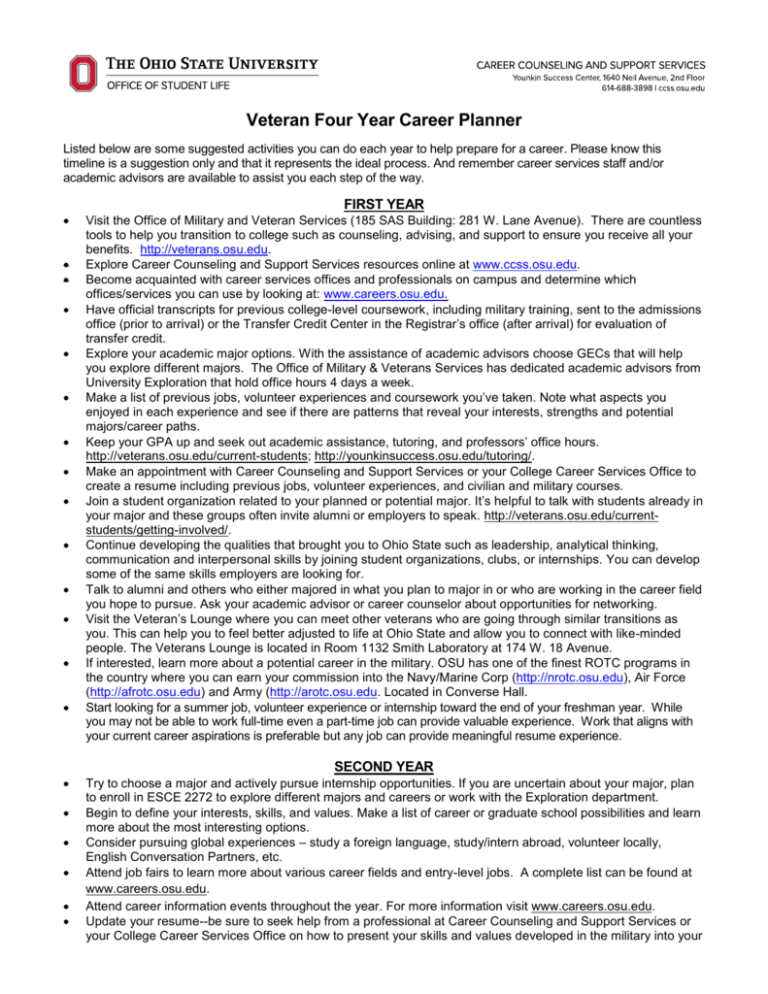
Veteran Four Year Career Planner Listed below are some suggested activities you can do each year to help prepare for a career. Please know this timeline is a suggestion only and that it represents the ideal process. And remember career services staff and/or academic advisors are available to assist you each step of the way. FIRST YEAR Visit the Office of Military and Veteran Services (185 SAS Building: 281 W. Lane Avenue). There are countless tools to help you transition to college such as counseling, advising, and support to ensure you receive all your benefits. http://veterans.osu.edu. Explore Career Counseling and Support Services resources online at www.ccss.osu.edu. Become acquainted with career services offices and professionals on campus and determine which offices/services you can use by looking at: www.careers.osu.edu. Have official transcripts for previous college-level coursework, including military training, sent to the admissions office (prior to arrival) or the Transfer Credit Center in the Registrar’s office (after arrival) for evaluation of transfer credit. Explore your academic major options. With the assistance of academic advisors choose GECs that will help you explore different majors. The Office of Military & Veterans Services has dedicated academic advisors from University Exploration that hold office hours 4 days a week. Make a list of previous jobs, volunteer experiences and coursework you’ve taken. Note what aspects you enjoyed in each experience and see if there are patterns that reveal your interests, strengths and potential majors/career paths. Keep your GPA up and seek out academic assistance, tutoring, and professors’ office hours. http://veterans.osu.edu/current-students; http://younkinsuccess.osu.edu/tutoring/. Make an appointment with Career Counseling and Support Services or your College Career Services Office to create a resume including previous jobs, volunteer experiences, and civilian and military courses. Join a student organization related to your planned or potential major. It’s helpful to talk with students already in your major and these groups often invite alumni or employers to speak. http://veterans.osu.edu/currentstudents/getting-involved/. Continue developing the qualities that brought you to Ohio State such as leadership, analytical thinking, communication and interpersonal skills by joining student organizations, clubs, or internships. You can develop some of the same skills employers are looking for. Talk to alumni and others who either majored in what you plan to major in or who are working in the career field you hope to pursue. Ask your academic advisor or career counselor about opportunities for networking. Visit the Veteran’s Lounge where you can meet other veterans who are going through similar transitions as you. This can help you to feel better adjusted to life at Ohio State and allow you to connect with like-minded people. The Veterans Lounge is located in Room 1132 Smith Laboratory at 174 W. 18 Avenue. If interested, learn more about a potential career in the military. OSU has one of the finest ROTC programs in the country where you can earn your commission into the Navy/Marine Corp (http://nrotc.osu.edu), Air Force (http://afrotc.osu.edu) and Army (http://arotc.osu.edu. Located in Converse Hall. Start looking for a summer job, volunteer experience or internship toward the end of your freshman year. While you may not be able to work full-time even a part-time job can provide valuable experience. Work that aligns with your current career aspirations is preferable but any job can provide meaningful resume experience. SECOND YEAR Try to choose a major and actively pursue internship opportunities. If you are uncertain about your major, plan to enroll in ESCE 2272 to explore different majors and careers or work with the Exploration department. Begin to define your interests, skills, and values. Make a list of career or graduate school possibilities and learn more about the most interesting options. Consider pursuing global experiences – study a foreign language, study/intern abroad, volunteer locally, English Conversation Partners, etc. Attend job fairs to learn more about various career fields and entry-level jobs. A complete list can be found at www.careers.osu.edu. Attend career information events throughout the year. For more information visit www.careers.osu.edu. Update your resume--be sure to seek help from a professional at Career Counseling and Support Services or your College Career Services Office on how to present your skills and values developed in the military into your resume. Go to http://asccareerservices.osu.edu/guides/resumes and click on the “Military Experience Resume Sample.” Checkout O Net’s Military Crosswalk tool http://www.onetonline.org/crosswalk/MOC/ that allows comparison of military occupational titles to civilian occupational titles. Learn to interview successfully and how to write a good cover letter. Find help by utilizing the OnPACE modules on the Buckeye Careers website under the “students” tab http://careers.osu.edu (and work with both Career Counseling and Support Services and your College Career Services Office). Strengthen transferable skills by obtaining a part-time job, summer job, internship, or volunteer experience. Find listings by talking to people in your network, looking online and attending job fairs on campus. http://careers.osu.edu. Stay in contact with the Office of Military and Veteran Services, College Career Services Office and Career Counseling and Support Services resources for potential internship and job opportunities throughout the year. Make an appointment with a career service professional if you are considering medical school, law school or other graduate school options to talk about timelines and preparation. Meet with your professors every semester to develop professional connections. Start collecting letters of recommendation from professors as well as supervisors from your employment, internship, and volunteer experiences. THIRD YEAR Make an appointment to see a career services professional to ensure that you are on target to achieve your career goals. Use informational interviewing to thoroughly investigate your favorite career options. Contact Ohio State alumni to conduct educational and career informational interviews. Continue to obtain experience that will position you well for graduate school or employment after graduation, such as volunteer work, part-time jobs, summer internships, and leadership positions in student organizations. Attend employer information sessions in your field of interest. Begin to do in-depth research into companies you will target for full-time employment next year. Keep an eye on their financial status to gauge stability. Update your resume and brush up on your interviewing skills. Join a professional association in your field of interest. If you plan to attend graduate or professional school after graduation: Continue identifying graduate school programs that are compatible with your educational and career goals. Begin obtaining letters of recommendation from faculty for your graduate school applications. Attend the Graduate & Professional School Expo in October http://www.ccss.osu.edu/gradexpo Become familiar with admissions procedures. Find out if you will need to take a standardized test for admission and plan to take it at an optimal time. FOURTH YEAR Obtain additional experience in your chosen field by searching for internships or part-time jobs through the career offices/services available to you. As you get closer to graduation, search for full-time job listings. Begin to actively conduct your full-time job search 6-9 months prior to graduation. Participate in on-campus recruiting if it is offered for your major and interview for positions before you graduate (ideally 6-9 months prior to graduation). Network with potential employers as much as possible your final year at Ohio State and attend employer information sessions. Start researching companies and organizations you wish to pursue for employment and go to career fairs held throughout the year. Polish your resume, job search letters, and interview skills Participate in a mock interview. Meet with a career services professional to determine which job search strategies would be optimal for you and learn more about career resources you can use during your search. Be sure that you have collected letters of recommendation from your faculty, advisors, and supervisors. Meet with your academic advisor if graduate or professional school is your next step after graduation to plan your application process. If you haven’t already done so, find out if standardized tests are required to apply to your target programs and plan to take them as soon as possible. Have your application and statement of purpose reviewed by a Career Counseling and Support Services counselor and a faculty member. Attend the Graduate & Professional School Expo in October http://www.ccss.osu.edu/gradexpo 3/27/2014
